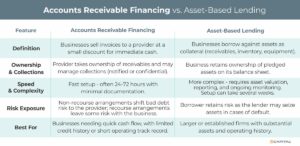In a stalled labor market, workers are hesitant to leave their current positions, and employers are cautious about hiring a workforce without the specialized skills needed for high-growth sectors. This makes recruiting more complex, requiring strategic adjustments to attract and secure top talent.
Staffing firms that proactively pursue innovation and operational agility are maintaining momentum in the war to attract, engage, and win top talent. Financial flexibility enables staffing firms to invest in new technologies, improve recruiting strategies, and adapt to shifting client demands.
This article explores how payroll funding streamlines cash flow, provides working capital, and supports investments in innovation and operational agility to enhance recruiting efficiencies and success.
Capitalizing on pent-up demand
Employment growth remains modest and uneven as companies continue to be cautious due to economic uncertainty and persistent inflationary pressures. Many employers are turning to temporary, contract, and project-based workers instead of permanent hires. While overall staffing growth is slow, specialized sectors—such as healthcare, IT, and skilled trades—are expected to maintain higher demand due to structural labor shortages.
Despite modest overall job growth, the staffing industry can thrive by focusing on specialization, skills development, and leveraging technology. In doing so, adaptive and agile staffing firms can serve immediate market needs while positioning their organization as an indispensable partner when hiring rebounds to fill pent-up demand.
Invest in recruiting technologies
Staffing firms aiming to boost recruiting success should focus on technologies that speed up talent acquisition, enhance match quality, and improve the candidate experience. A recent Bullhorn report shows most firms are still early in digital transformation, despite knowing it’s critical to unlock the full potential of recruiters and data. The most competitive staffing firms are leading the adoption of AI, automation, and data analytics, despite efforts to reduce SG&A expenses, as long as they demonstrate ROI.
- Smart sourcing tools scan job boards, LinkedIn, and niche talent communities in real time to identify and match candidates with openings based on skills and experience.
- Digital recruitment platforms, AI-driven candidate screening, and automated onboarding tools can reduce costs, speed hiring, and improve candidate experience.
- Investments in training and upskilling programs that position staffing firms as both recruiters and talent developers enhance their appeal to both clients and job seekers.
Staffing firms with the financial flexibility to invest in advanced recruiting systems, improve candidate experience, and upskill their workforce are best positioned to weather a slow labor market. More significantly, they will be among the first to benefit from renewed hiring momentum when the labor market rebounds with pent-up demand. These investments aren’t being deferred by forward-thinking agencies; instead, they’re seen as essential to positioning for accelerated recovery and long-term differentiation.
The financial flexibility to invest
Industry authorities, supported by data, largely agree that investing in competitive advantages now, such as advanced technology or operational improvements, even in a sluggish market, is a strategic move to emerge stronger from a downturn, not a risk to defer.
However, investments typically require either growth capital (usually equity or a mix of equity and debt) or working capital. Growth capital often involves giving up some ownership and control to investors. While it provides access to significant funds, it may increase pressure for faster returns, potentially compromising long-term strategic independence. On the other hand, working capital offers the advantage of greater financial flexibility, enabling businesses to fund investments without sacrificing ownership or accumulating additional debt. Solutions like Payroll Funding can offer faster access to working capital than traditional financing options with more flexible structures and minimal to no restrictive covenants.
Payroll funding is designed to give staffing firms fast access to working capital and the financial flexibility needed to invest in recruiting technologies, training, and operational agility.
Payroll funding
Payroll funding ensures staff get paid on time and operations stay on track, even with extended client payment terms. This funding option can be structured as accounts receivable (A/R) financing, asset-based lending (ABL), or a combination of both.
A/R Financing is a straightforward, cost-effective strategy to accelerate cash flow. It is a short-term financing tool that converts unpaid invoices into immediate cash, without incurring debt or diluting equity.
How It Works
- Submit client invoices to a payroll funding provider.
- The provider typically advances up to 90% of the invoice value, sometimes higher depending on client and invoice profile, often on the same or next day.
- The provider manages collections, ensuring professional and courteous accounts receivable management. This service can be structured as either a notified arrangement, where the debtor is explicitly informed, or as a confidential service, in which the debtor remains unaware of the involvement of a third-party collector.
- Once the client pays the invoice, the balance owing is transferred to the firm, minus a small fee.
Asset-Based Lending
Asset-based lending (ABL) is a straightforward and cost-effective secured financing tool that converts assets into working capital.
How It Works
- The business submits assets, (most commonly accounts receivable) as collateral to an ABL provider.
- The provider appraises these assets and advances a percentage of their value, typically up to 90%, based on asset type and quality.
- The borrower draws funds as a lump sum or through a revolving credit line.
- The lender monitors collateral values throughout the facility term to adjust borrowing capacity accordingly.
- As payments are made, borrowing capacity is replenished based on remaining collateral value.
Key benefits of payroll funding
- Improved Cash Flow & Stability
Accelerated cash flow ensures payroll and other obligations are met on time, as enhanced credit risk management mitigates bad debt. - Supports Growth & Scalability
Access financing facilities up to $100 million to take on larger contracts, scale rapidly, and invest in growth. - MSP Support
Some providers, like eCapital, support Managed Service Provider (MSP) relationships to ensure essential funding is in place.
A strategic financing option
Liquidity is essential for financial flexibility and operational agility. It provides businesses with the working capital needed to capitalize on efficiencies and opportunities, critical in a tight market. Payroll funding provides staffing firms a strategic financing option that delivers fast access to working capital with a flexible structure and minimal to no restrictive covenants. With payroll funding, you can access financing up to $100 million and select either recourse or non-recourse facilities.
Further to fast and reliable cash flow, payroll funding helps stabilize financial structures and enhances credit management efficiencies. Confidence in a staffing company’s financial position and ongoing ability to provide steady employment is paramount for recruiting and retaining top talent.
Industry expertise and reliability
Partnering with experienced payroll funding providers is more than a competitive advantage —it’s a strategic growth enabler.
These providers understand the industry’s unique cash flow dynamics, seasonal hiring, and temporary payroll cycles. Many of these providers offer full-service back-office support such as invoice management, market insights to guide contract evaluation, and innovative solutions to address complex financial challenges.
Conclusion
As hiring is expected to improve, firms with strong cash flow and financial stability will have a distinct advantage in the talent war. Payroll funding accelerates cash flow, provides working capital, and empowers firms to invest in recruiting technologies, training, and operational improvements without incurring debt.
Enhanced liquidity supports stable financial structures by bridging the gap between timely financial obligations and extended client payment terms.
Technology enhances efficiency but doesn’t replace personal relationship building. Forward-thinking staffing firms that combine advanced technology with the human touch and specialized expertise are best positioned to win top talent.
Contact us to consult with an experienced payroll funding specialist and discover the advantages of strategic financing to support enhanced recruiting strategies and capabilities.
Key Takeaways
- Forward-thinking staffing firms that combine technology with human touch and specialized expertise are best positioned to win the talent war.
- Financial flexibility enables staffing firms to invest in recruiting strategies and operational improvements without cash flow constraints.
- Payroll funding is a straightforward, easy-to-manage and cost-effective strategy to access working capital, stabilize financial structures, and gain financial flexibility without incurring debt or diluting equity.
- Financial stability and flexibility provide staffing firms a distinct advantage in the talent war.
ABOUT eCapital
At eCapital, we accelerate business growth by delivering fast, flexible access to capital through cutting-edge technology and deep industry insight.
Across North America and the U.K., we’ve redefined how small and medium-sized businesses access funding—eliminating friction, speeding approvals, and empowering clients with access to the capital they need to move forward. With the capacity to fund facilities from $5 million to $250 million, we support a wide range of business needs at every stage.
With a powerful blend of innovation, scalability, and personalized service, we’re not just a funding provider, we’re a strategic partner built for what’s next.





